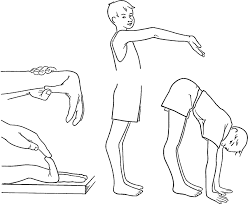What is hypermobility?
Note: In this blog when we refer to women/females we are referring to those presumed female at birth
If you have hypermobile joints, you most likely have connective tissue which is more stretchy than other people in the population.
Connective tissue is the tissue which holds your joints together. The main protein in connective tissue is collagen. Connective tissue also surrounds your organs and holds organs in place. Connective tissue is in fact, all around the body. After all, all parts of the body are connected….
Some people are naturally more flexible and bendy than others. There is a set of tests that can be done which gives us a score out of 9. Those who score more than 6 out of 9 are considered to be “Hypermobile”.
The test is called the Beighton Score and there is a one point score for each of the following
(You can see this at www.ehlers-danlos.com/assessing-joint-hypermobility/)
- Little finger bends back to 90 degrees or more on the left and right 2 points
- Thumb can be pulled down to touch the forearm on the left 2 points
- Elbows extend backwards more than 90 degrees on the left 2 points
- Knees extend backwards more than 10 degrees on the left 2 points
- When you bend forward to touch your toes, you can easily place the hands flat on the floor with straight knees. 1 point

Why does it matter?
It matters because those who are hypermobile may live with more joint and muscle pain than other people. Also, to answer the title question of this blog, those who are hypermobile may have more incidence of pelvic organ prolapse.
If you have one of 13 recognised hypermobility disorders, you might have all sorts of symptoms that seem vague and difficult to understand, but you know they are real. Trying to convince someone else that they are is the issue. We meet so many people who are hypermobile but have never had it identified. They come to see us with pelvic floor problems. But there are lots of other symptoms unrelated to the pelvic floor – one of the symptoms, for example, might be a tendency to low blood pressure which can cause dizziness. Another strange symptom is trouble in lifts – as the lift goes up you don’t have the blood vessel support to keep the blood to the brain so you feel dizzy. But not everyone with a connective tissue disorder will have this symptom. It’s just an example of one of the odd symptoms that seems difficult to understand.
Ehlers Danlos Syndrome
The EHLERS DANLOS society (www.ehlers-danlos.com/what-is-eds/) refer to the fact that pelvic organ prolapse is more prevalent in this population under their description of possible joint symptoms. They write that joint signs may include
Joint pain (arthralgia) and deformity muscle pain (myalgia), and nerve pain (neuralgia), loose/unstable joints which are prone to frequent dislocations and/or subluxations and injury muscle tension and weakness, weakness of the voice box and larynx, hernias, pelvic floor weakness and prolapses of the rectum, bladder or vaginal wall and uterus, and nerve disorders (neuropathy) from cord and nerve entrapment or sensory nerve damage.
My observation over the years.
I have made some observations over my working life. I have noticed that there is a certain group of women who come to see us with symptoms of pelvic organ prolapse. They might be young women who have had a vaginal delivery who present with mild prolapse. And yet they report that the prolapse is way more bothersome and uncomfortable that the degree of prolapse suggests. These women are often frustrated and confused: they are being told there is nothing serious to worry about and yet they feel terrible. Then I might think to check the Beightons Score and I find that the joints are hypermobile. I don’t know what the evidence or mechanism for this is. I suspect some sort of altered sensory information from the connective tissue. The important thing though, is that we acknowledge that if a woman feels symptoms, these symptoms are real. We need to try and help take the symptoms away and not keep telling this woman that she doesn’t have a problem.
Pelvic organ prolapse can be quite obvious in some women yet they have no symptoms, and in other women it seems quite mild and yet they feel extremely uncomfortable and worried. We need to listen to women and respect that they know what they are feeling.
Finally
If you have prolapse symptoms, come and see us for help. If you have a connective tissue disorder and are worried, stay ahead by doing great pelvic floor exercise for life to prevent pelvic floor problems associated with your hypermobility. We’d love to see you.



